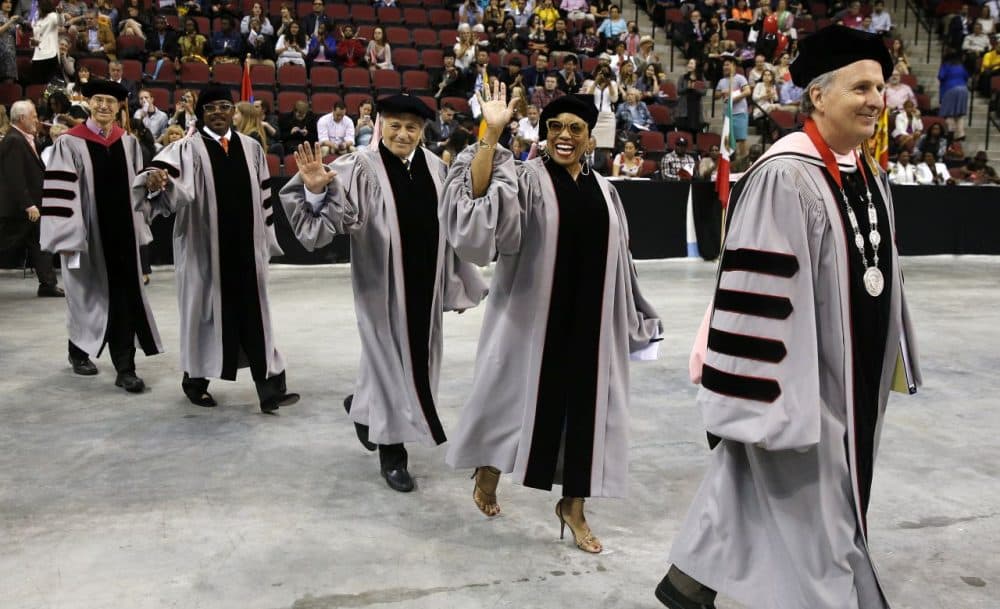Advertisement
Musicians, Authors, Political Figures Address Boston Area Commencement Ceremonies

It's the middle of May, and that means it's time for college students to sit through one last lecture — at commencement. We've listened to commencement speeches from schools all over Boston and there are a few standout hits.
Students at Berklee College of Music heard from three-time Grammy Award-winning jazz singer Dee Dee Bridgewater. She reminded them to hold onto their dreams in the music industry, because that's all she had. She said:
My father chaperoned me when, on one of the prizes that I won, I had to sing at a local club called the Motor City Jazz Club. I had to sit in the kitchen while the main act performed. It was a certain Grant Green and a young musician he was mentoring, someone by the name of George Vincent. Now, it was my father who took me seriously when I started out — getting me my first audition for Motown Records, where Berry Gordy heard me sing and told my father, "You bring her back when she's 18. I want to sign her. I can't sign her right now because we have Stevie Wonder and we're having too many child labor issues." But on that ride home, I said to my daddy, "This isn't my dream. I want to sign to Capitol Records because that's where Nancy Wilson is." Because, you see, Nancy Wilson was my 'shero,' to borrow that phrase. But you know what? That's life when you're 16. You don't know how difficult things are. You just think it's like that — a snap of your finger. I was oblivious to how difficult obtaining a recording contract could be. I just knew I had a dream that I was going to follow. When I look back now on all that I've accomplished around the world, I am flabbergasted. Everything happened because I dared to dream.
Over at Lesley University Saturday, children's author Chris Van Allsburg remembered how, before he was famous for "The Polar Express" and "The Garden of Abdul Gasazi," he'd barely drawn or written in his life. It was only chance that led him to his career.
Today, I am being honored for achievement in a field I knew nothing about when I began working in it. We are all familiar with the metaphors for success that invoke images of scaling mountains or climbing ladders. In my career, it has been more like water running downstream, seeking its lowest level while having its course constantly altered by changes in the shape of the ground. So, for me, it was not dreams and determination that led to my life's work. It was, initially, a penny-pinching landlord. A few years out of art school, I was forced to re-locate my Providence sculpture studio. When winter arrived, I discovered the owner of the old building where I had rented space turned the heat off promptly at 5 p.m. As a young artist filled with energy and ideas, I was accustomed to working late into the night, but unfortunately, my creative fire alone could not keep me warm. It was not possible to make sculpture in a studio where the clay froze at midnight, as I struggled to model it wearing gloves with no fingers. I needed a hobby to occupy my evenings, something the keep me busy and less likely to produce frostbite.
And Tufts University got a visit from former Secretary of State Madeleine Albright Sunday. She argued that America needs to use its position in the world to fight against global inequality.
I have traveled almost everywhere, and I have found that there are essentially three categories of countries in the world today. In the first, people work all day and still don't have enough to eat. In the second, families are able to scrape together just enough food to meet their basic needs. In the third category of countries, diet books are bestsellers. Of course, the same distinctions also apply to the neighborhoods of Boston and Baltimore, and to the mountains in Appalachia and the American west. Confronted with this hard truth, some people simply shrug their shoulders and say that such inequality is too bad, but there's not anything that anybody can do about it. I say, such unfairness is intolerable and we each have a responsibility to change it.
Albright also acknowledged Tufts students who demonstrated against the firing of 35 janitors, and congratulated the school for being recognized by the Truman Scholarship Foundation, which she chairs.
This segment aired on May 19, 2015. The audio for this segment is not available.